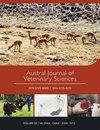生姜对肉种鸡睾丸的影响
IF 0.8
4区 农林科学
Q3 VETERINARY SCIENCES
引用次数: 1
摘要
摘要:生姜的根茎是植物生姜(Zingiber officinale)的新鲜或干燥器官,自古以来就被用作药物。本研究旨在探讨生姜对肉鸡公鸡睾丸组织形态学的影响。本试验选用308罗斯品种肉鸡单日公鸡80只。试验鸡分为两组,每组40只,分别为试验组和对照组。最初,姜的根茎被制成粉末;从繁殖季节开始,生姜组日粮中添加1 g/kg姜粉。每只鸡在20周龄时采集血液样本。样品用H&E染色。数据以mean±SD表示。采用t检验对对照组和实验组之间的差异进行分析比较,采用SPSS 9.0软件。试验组睾丸激素水平、睾丸重量、精管厚度和精子数量均显著高于对照组P<0.05。用生姜治疗的对照组和干预组之间最重要的区别是精管管腔内精子细胞和类精子细胞的数量和密度。本研究对生姜在肉鸡鸡群中的应用效果取得了积极的结果。本文章由计算机程序翻译,如有差异,请以英文原文为准。
The effect of ginger on testis of Broiler breeders
Abstract: The rhizome of ginger is a fresh or dried organ of the plant Zingiber officinale, which has been used as a medicine since ancient times. The present study was conducted to examine the effects of ginger on testicular histomorphometry in roosters of broiler chicken flocks. Eighty single-day rooster of broiler chickens belonging to 308 Ross breed was used in the present study. The chickens were divided into two groups with 40 broiler roosters (experimental and control groups). Initially, the rhizome of ginger was powdered; 1 g/kg of ginger powder was added to the ration of the group treated with ginger from the beginning of the breeding season. The blood samples were taken from each chick at 20 weeks of age. The samples were stained with H&E. Data was expressed as mean ± SD. T-test was used to analyse and compare the difference between the control is also an experimental groups using SPSS 9.0 software. The testosterone level, weight of the testicle, thickness of seminal tube and number of spermatids in the experimental group compared to the control group increased significantly P<0.05. The most important difference between the control and the intervention group treated with ginger was the number and density of spermatids and spermatozoids cells in the lumen area of the seminal tubes. The present study obtained positive results for the efficacy of using ginger in roosters of broiler chick flocks.
求助全文
通过发布文献求助,成功后即可免费获取论文全文。
去求助
来源期刊

Austral Journal of Veterinary Sciences
Veterinary-General Veterinary
CiteScore
1.60
自引率
0.00%
发文量
18
期刊介绍:
Austral Journal of Veterinary Sciences (formerly Archivos de Medicina Veterinaria) publishes original scientific contributions in English, containing the latest developments and discoveries in veterinary sciences. The journal covers topics such as animal health and production, preventive medicine, zoonosis, pharmacology and therapeutics, methods of diagnosis, and other areas related to the veterinary field.
Austral Journal of Veterinary Sciences aims to divulge information about advances in veterinary medicine among universities, research centres, industries, government agencies, biologists, agronomists and veterinarians.
 求助内容:
求助内容: 应助结果提醒方式:
应助结果提醒方式:


